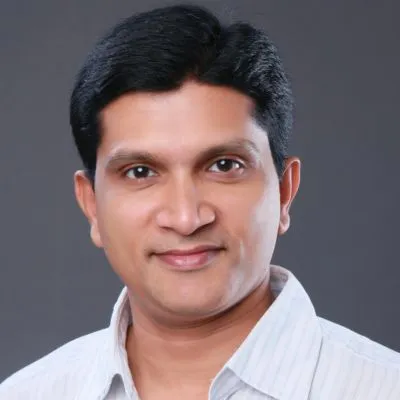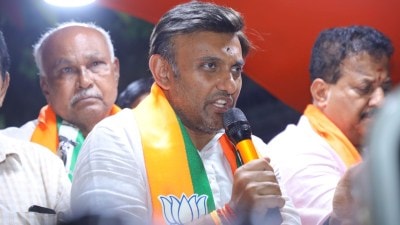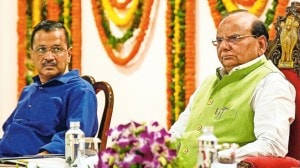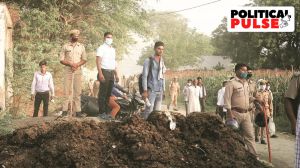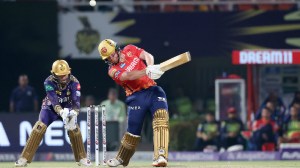- India
- International
SC grants interim relief to Sena rebels, asks if Dy Speaker can decide on own removal
Told courts cannot intervene in House matter, bench says judicial review not barred
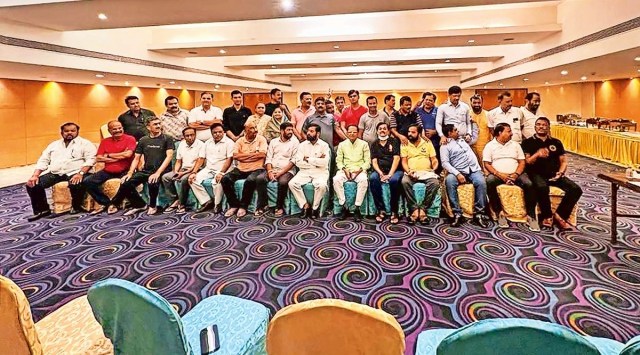 The rebel Maharashtra MLAs at a hotel in Surat. (PTI, file)
The rebel Maharashtra MLAs at a hotel in Surat. (PTI, file)Shiv Sena rebel MLAs, who had been asked by Maharashtra Deputy Speaker Narhari Zirwal to reply by Monday evening to notices on pleas seeking their disqualification from the Assembly, got interim relief when the Supreme Court said they had time until 5.30 pm on July 12 to send their replies.
The vacation bench of Justices Surya Kant and Justice J B Pardiwala which issued notice on two petitions — one by Sena rebel leader Eknath Shinde and another by 15 MLAs of his faction who had been served disqualification notices — fixed July 11 as the next date of hearing.
“In the meanwhile, as an interim measure, the time granted by Deputy Speaker to petitioners or other similarly placed MLAs to submit their written submissions today by 5.30 pm be extended till July 12, 2022, 5.30 pm,” the bench directed.
Taking note of the rebel MLAs’ submission that their life and property were under threat, the bench recorded the statement of the Maharashtra standing counsel that “adequate steps have already been taken and the state government shall further ensure that no harm is caused to the life, liberty and property of the 39 MLAs or their family members”.
It directed that a counter-affidavit be filed by the respondents within five days and that the MLAs could file rejoinder affidavits, if any, within the next three days.

It also sought a counter-affidavit after the MLAs and the Assembly Deputy Speaker sought to contradict each other on the notice claimed to have been served by the dissident MLAs, seeking disqualification of the Deputy Speaker.
The Deputy Speaker contended that the notice was sent from an unregistered email and was not taken on record as its genuineness was in doubt. The bench wondered what steps had been taken to check its genuineness and directed that the developments in this be explained in an affidavit.
Senior Advocates A M Singhvi and Devdutt Kamat, appearing for the Deputy Speaker and other respondents, opposed the prayer for interim orders, saying disqualifications proceedings by Speaker/Deputy Speaker were proceedings of the House and courts cannot intervene.
But the bench referred to a Supreme Court ruling which said a judicial review is not barred.
Appearing for the rebel MLAs, Senior Advocate Neeraj Kishan Kaul referred to the 2016 Constitution Bench ruling in Nabam Rebia vs Deputy Speaker, Arunachal Pradesh Assembly to argue that Speaker/Deputy Speaker of an Assembly cannot decide on disqualification of MLAs while a motion for his or her removal is pending.
It “categorically says that till the issue of removal of the Speaker or the Deputy Speaker is decided, till then the Speaker will not proceed with the disqualification or consideration of the disqualification of any of the members. And the reason for that is, as the SC says, that apart from everything else, many political considerations come into these matters and if during a period of 14 days which Article 179 (c) provides — that you first issue a notice and within 14 days thereafter, that notice under the rules is read out in the Assembly and a motion is moved if during that period a Speaker tends to disqualify what he considers to be an inconvenient set of people and reduces the strength, which is exactly what has been sought to be done in this matter, then it completely subverts the provisions of the Constitution, destroys the spirit of the Constitution”, Kaul said.
Pointing out that the rebel MLAs had served notice for removal of the Deputy Speaker on June 25, even before the disqualification notices were issued to them on June 25, Kaul asked “How can the Deputy Speaker at all proceed with the matter when a Constitution Bench of the SC says that when his own issue of removal is not decided, till then he cannot proceed with disqualification?”.
When the bench asked why can’t these questions be raised before the Deputy Speaker himself, Kaul said the Supreme Court says he cannot deal with it at all.
To a specific query from the bench on why they had not approached the High Court under Article 226 of the Constitution, Kaul referred the bench to statements by Shiv Sena leaders like Sanjay Raut and said the atmosphere in Mumbai is not conducive to their pursuing legal remedies there.
Pointing out that the Shinde camp with 39 MLAs was the majority Shiv Sena, Kaul said “a minority of a legislature party today… is actually subverting the entire state machinery. Our houses are being burnt, we are being physically threatened… a party spokesperson says 40 bodies will arrive from Gauhati, they will be slaughtered like bulls and you wait and see what will happen in days to come, how they will be treated”.
“The atmosphere and the environment is not at all conducive for us to legitimately pursue our legal and constitutional rights in Bombay at the moment because that is the kind of atmosphere which has been vilified…” he said.
Singhvi, appearing for Shiv Sena legislature party leader Ajay Chaudhari and chief whip Sunil Prabhu, said the Nabam Rebia judgment is “inapplicable” to the Maharashtra situation and has been “wrongly interpreted to the court” by the petitioners.
He said the issues raised in the petition could very well be decided by the High Court too. Leapfrogging, he said, is allowed by the Supreme Court but only in rare cases, and just because something has been coming in the press or just because it has some amount of public life in it, it is not a reason to leapfrog. The petitioners, he said, had given no reason why they should not be asked to move the High Court.
“Not one single case in India, barring the Rajasthan High Court interim order, which is pending in the SC, in no case has your Lordships interdicted or acted while the Speaker is seized of the matter,” Singhvi said.
Next steps unclear
While the SC has granted interim relief to the Sena rebel MLAs, it is not clear what happens next on the ground. If a floor test is called before the next court hearing, it could trigger another chain of events.
He pointed to the SC’s February 1992 ruling in Kihoto Hollohan vs Zachillhu and Others to contend that no proceedings would lie before any court on the actions of the Speaker until he or she decides an issue before them finally.
Justice Surya Kant sought to know if Kihoto was also a case where the Speaker’s very continuation or removal was in question.
No, replied Singhvi, adding that there was no judgment which had that issue until Nabam Rebia which however “is consistent with Kihoto Hollohan that let the Speaker decide even wrongly” and the SC “will then interfere on a final order”.
On the notice by the rebel MLAs for disqualification of the Speaker, Singhvi said as per press reports, they “sent from an unknown, unverified email, and did not present to the Speaker a notice effectively saying one line ‘we have lost confidence in you’.”
“And the Speaker has already not taken it on record and rejected it unless satisfied that it is a valid no-confidence motion. It is already decided,” he said.
The court wondered if the Deputy Speaker himself could decide on the notice for his removal.
“Absolutely, he can decide the validity of the notice,” replied Singhvi.
The bench said if the Deputy Speaker is claiming that no notice for his removal was served, it will have to call for an affidavit of the prescribed authority.
Singhvi said it is a case where an email was sent which was treated as a notice and rejected by the Deputy Speaker.
Justice Surya Kant said then it raised the question “could the Deputy Speaker become judge in his own cause?”
Senior Advocate Rajeev Dhavan, appearing for the Deputy Speaker, said there was a notice to which the Deputy Speaker had also sent a reply in which he said “unless and until the genuineness and veracity of such communication and its signatories is ascertained, no further action can be taken” and therefore it “is not being taken on record”. He said it was not sent from a registered email, and not sent to the legislative office.
Justice Surya Kant said some officer concerned must file an affidavit and say on record what happened, in what manner it was received, whether genuineness was ascertained. Dhavan agreed to do so.
Senior Advocate Devdutt Kamat, also appearing for the respondents, said the SC had in a 2020 “conclusively decided” that in matters challenging disqualification, the party should first approach the HC.
He also argued that a notice for disqualification of the Speaker cannot be issued until the Assembly is in session.
Kamat said the whole “bogey of no-confidence against the Speaker” does not have the sanction of the Constitution. While there can be no-confidence motions against the Chief Minister, the term used for Speaker or Deputy Speaker is “removal” because “there has to be a cause”.
Seeking to fix the next hearing on July 11, the bench sought to know whether it could record a statement that the Deputy Speaker would keep the disqualification matter in abeyance until then.
Dhavan said he does not have any instruction following which the bench said it will then have to say something in the order.
Opposing this, Singhvi said there is no need to record and that if the court were to do so, “mutual respect between the legislature and judiciary will be violated” and they it “would amount to an interim stay”.
“There is no order of any court staying disqualification when the proceedings have started,” said Kamat who also opposed the suggestion for an interim order.
He said the disqualifications proceedings were proceedings in the House as per the Tenth Schedule of the Constitution and, therefore, till a final order is passed, there is no question of judicial review.
“Ultimately… we have to determine the competence of the Deputy Speaker to proceed in the matter. Now in that event, suppose today if we don’t pass any appropriate interim order, which means the Deputy Speaker will be entitled to, in law, to proceed on merits and pass orders,” Justice Kant said.
Apr 27: Latest News
- 01
- 02
- 03
- 04
- 05











